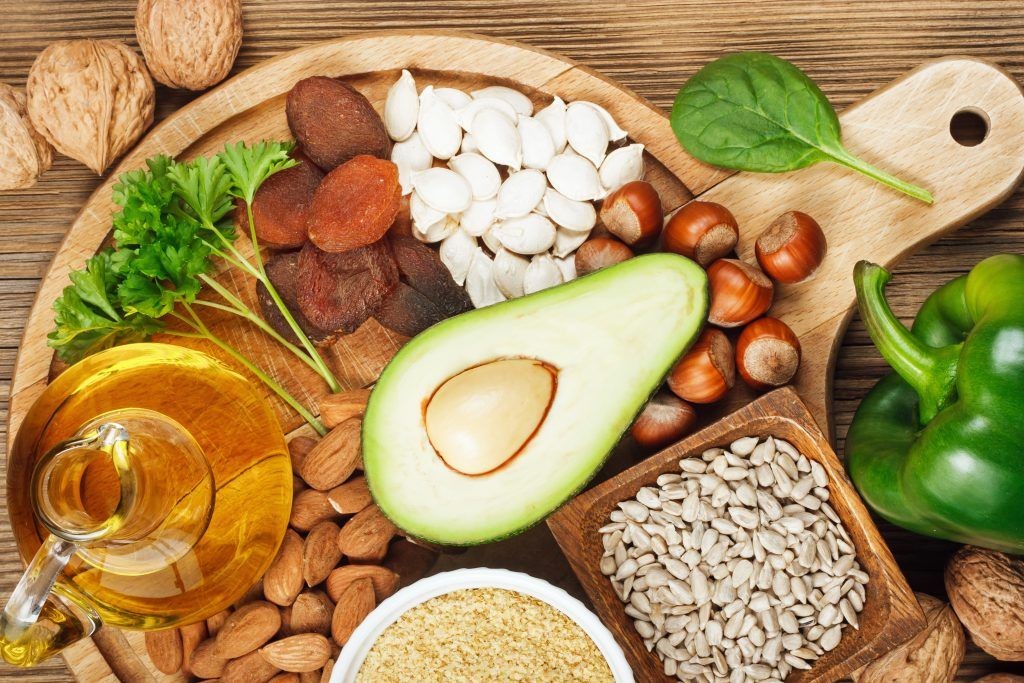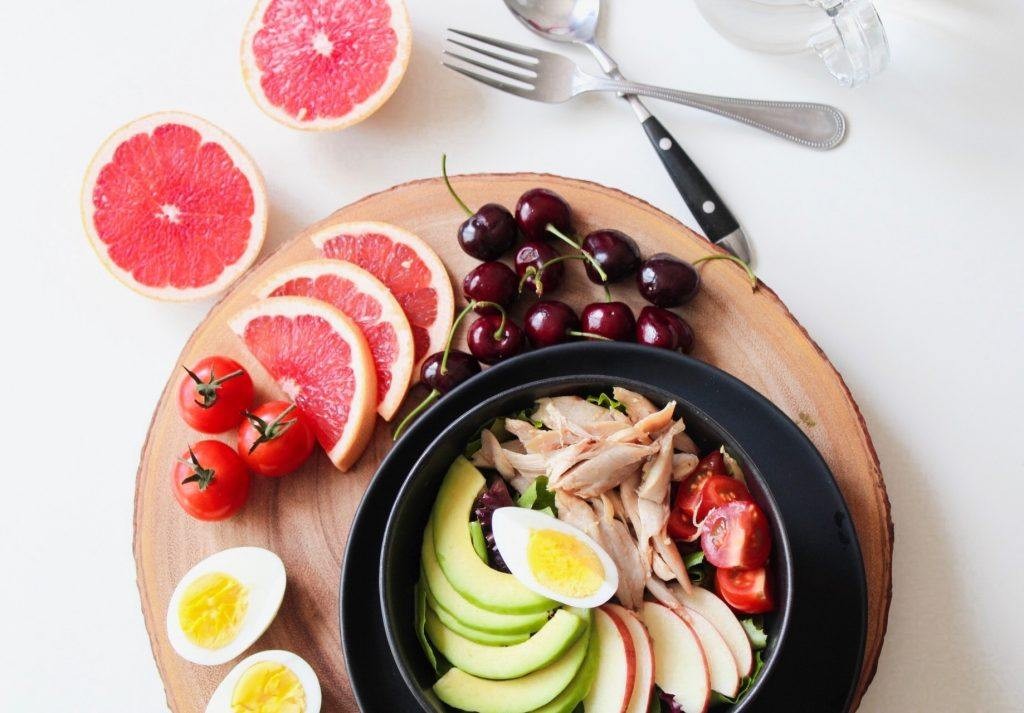Vitamin E Foods are crucial for maintaining overall health. FOODS.EDU.VN provides comprehensive information on incorporating vitamin E-rich foods into your diet. Discover how to boost your immune system, protect your cells, and prevent chronic diseases by including these essential nutrients in your meals. Explore a variety of delicious and nutritious options, along with expert tips for maximizing their benefits.
Table of Contents:
-
4. What Are The Benefits Of Including Vitamin E Foods In Your Diet?
-
9. What Are The Effects Of Vitamin E On Age-Related Vision Diseases?
-
10. How Does Vitamin E Affect Cognitive Function And Neurodegenerative Diseases?
-
15. How Can You Incorporate Vitamin E Foods Into Your Meals?
-
18. How Do Cooking Methods Affect Vitamin E Content In Foods?
1. Why Is Vitamin E Important?
Vitamin E is vital because it acts as a powerful antioxidant, protecting your cells from damage caused by free radicals. According to research from the National Institutes of Health (NIH), vitamin E also supports immune function and helps prevent blood clots. For more in-depth information on the benefits of vitamin E, FOODS.EDU.VN offers a wealth of resources to enhance your understanding of this essential nutrient. Including vitamin E-rich foods in your daily diet can significantly contribute to your overall well-being.
Vitamin E plays a crucial role in maintaining cellular health by neutralizing harmful free radicals.
2. What Is The Recommended Daily Intake of Vitamin E?
The recommended daily intake (RDI) of vitamin E for adults is 15 mg (22.4 IU), as noted by the NIH. Pregnant women need the same amount, while lactating women require slightly more, about 19 mg (28.4 IU) daily. Ensuring you meet these recommendations through vitamin E foods or supplements can help maintain optimal health. For personalized dietary advice and detailed nutritional information, visit FOODS.EDU.VN to learn more.
| Group | Recommended Daily Intake (mg) | Recommended Daily Intake (IU) |
|---|---|---|
| Adults | 15 | 22.4 |
| Pregnant Women | 15 | 22.4 |
| Lactating Women | 19 | 28.4 |


3. What Are The Top Vitamin E Foods?
The best vitamin E foods include wheat germ oil, sunflower seeds, almonds, spinach, and avocados. Wheat germ oil is exceptionally rich in vitamin E, providing over 20 mg per tablespoon. Sunflower seeds and almonds are excellent snacks, offering 7.4 mg and 6.8 mg per ounce, respectively. Green vegetables like spinach provide about 2 mg per half-cup cooked. Avocados are not only delicious but also contain approximately 4 mg of vitamin E per fruit. To discover more vitamin E-packed options and their nutritional profiles, check out FOODS.EDU.VN for comprehensive guides and recipes.
| Food | Serving Size | Vitamin E Content (mg) |
|---|---|---|
| Wheat Germ Oil | 1 tablespoon | 20+ |
| Sunflower Seeds | 1 ounce | 7.4 |
| Almonds | 1 ounce | 6.8 |
| Spinach (Cooked) | 1/2 cup | 2 |
| Avocado | 1 fruit | 4 |
4. What Are The Benefits Of Including Vitamin E Foods In Your Diet?
Including vitamin E foods in your diet offers numerous health benefits, primarily due to its antioxidant properties. Vitamin E helps protect cells from oxidative stress, supports a healthy immune system, and promotes heart health. Some studies suggest it may also play a role in preventing chronic diseases such as cancer and age-related macular degeneration. FOODS.EDU.VN provides a wealth of articles and research insights that detail the specific advantages of vitamin E and how it contributes to overall wellness.
- Cell Protection: Shields cells from damage caused by free radicals.
- Immune Support: Boosts immune system function.
- Heart Health: Promotes cardiovascular wellness.
- Chronic Disease Prevention: May reduce the risk of cancer and macular degeneration.
5. How Does Vitamin E Function As An Antioxidant?
Vitamin E functions as an antioxidant by neutralizing free radicals, unstable molecules that can damage cells and contribute to aging and various diseases. It donates electrons to these free radicals, stabilizing them and preventing them from causing harm. This antioxidant activity is particularly important in protecting cell membranes from lipid peroxidation, a process that can lead to cellular dysfunction. To understand more about the science behind vitamin E and its antioxidant effects, explore the educational resources available at FOODS.EDU.VN.
6. What Role Does Vitamin E Play In Immune Function?
Vitamin E plays a crucial role in enhancing immune function by supporting the activity of immune cells. Studies have shown that adequate vitamin E intake can improve the body’s response to infections and reduce the risk of chronic diseases by modulating immune cell signaling. It also helps protect immune cells from oxidative damage, ensuring they function optimally. For a deeper dive into how vitamin E bolsters your immune system, visit FOODS.EDU.VN for expert articles and practical tips.
7. How Can Vitamin E Foods Support Heart Health?
Vitamin E foods support heart health by preventing the oxidation of LDL cholesterol, a key factor in the development of atherosclerosis (hardening of the arteries). By reducing LDL oxidation, vitamin E helps prevent plaque formation in arteries, lowering the risk of heart disease and stroke. Additionally, vitamin E’s antioxidant properties can improve blood vessel function and reduce inflammation. For more detailed information on how vitamin E benefits cardiovascular health, check out the comprehensive resources at FOODS.EDU.VN.
8. Can Vitamin E Foods Help Prevent Cancer?
Research on vitamin E foods and cancer prevention is ongoing, with some studies suggesting a potential protective effect. Vitamin E’s antioxidant properties may help prevent DNA damage, a critical step in cancer development. While some studies show no significant impact, others indicate that vitamin E may reduce the risk of specific cancers, such as prostate cancer in certain populations. It’s essential to maintain a balanced diet and consult healthcare professionals for personalized advice. FOODS.EDU.VN offers up-to-date research and articles on the role of vitamin E in cancer prevention.
9. What Are The Effects Of Vitamin E On Age-Related Vision Diseases?
Vitamin E, often combined with other antioxidants like vitamin C, beta-carotene, and zinc, has shown promise in protecting against age-related macular degeneration (AMD), a leading cause of vision loss. While vitamin E alone may not significantly prevent AMD or cataracts, its synergistic effect with other nutrients can reduce the risk of advanced stages of AMD. For detailed insights into how vitamin E supports eye health and the latest research findings, visit FOODS.EDU.VN.
10. How Does Vitamin E Affect Cognitive Function And Neurodegenerative Diseases?
The impact of vitamin E on cognitive function and neurodegenerative diseases like Alzheimer’s and Parkinson’s is an area of active research. Some studies suggest that vitamin E, especially when combined with vitamin C, may improve cognitive function and reduce the risk of dementia. However, other studies have not found significant benefits. Vitamin E’s antioxidant properties may help protect brain cells from oxidative stress, a factor implicated in neurodegenerative diseases. For the latest information and expert analysis on this topic, explore the resources at FOODS.EDU.VN.
11. What Are The Signs Of A Vitamin E Deficiency?
Signs of a vitamin E deficiency are rare but can include muscle weakness, loss of muscle mass, peripheral neuropathy (nerve damage), vision problems, and a weakened immune system. Prolonged deficiency can lead to more severe neurological issues. If you suspect a vitamin E deficiency, it’s crucial to consult a healthcare professional for proper diagnosis and treatment. For more information on identifying and addressing nutrient deficiencies, FOODS.EDU.VN offers comprehensive guides and expert advice.
- Muscle Weakness
- Loss of Muscle Mass
- Peripheral Neuropathy
- Vision Problems
- Weakened Immune System
12. Who Is At Risk Of Vitamin E Deficiency?
Individuals with digestive disorders that impair fat absorption, such as cystic fibrosis, Crohn’s disease, and celiac disease, are at a higher risk of vitamin E deficiency. Premature infants and people with rare genetic disorders like abetalipoproteinemia are also susceptible. Ensuring adequate vitamin E intake is particularly important for these groups. FOODS.EDU.VN provides tailored nutritional guidance and resources to help those at risk manage their vitamin E levels effectively.
| Group | Reason for Increased Risk |
|---|---|
| People with Digestive Disorders | Impaired fat absorption (e.g., Cystic Fibrosis, Crohn’s Disease) |
| Premature Infants | Limited vitamin E stores |
| People with Abetalipoproteinemia | Rare genetic disorder affecting fat absorption |
13. Can You Consume Too Much Vitamin E?
While vitamin E is essential, excessive intake, particularly from supplements, can lead to adverse effects. High doses of vitamin E can interfere with blood clotting, increasing the risk of bleeding. The upper tolerable intake level (UL) for adults is 1,000 mg (1,500 IU) per day. It’s best to obtain vitamin E primarily from food sources to minimize the risk of overconsumption. FOODS.EDU.VN offers valuable information on safe vitamin E intake and the potential risks of supplementation.
14. Are There Any Side Effects Of Vitamin E Supplements?
Side effects from vitamin E supplements are rare at recommended doses but can occur with high intakes. These may include nausea, diarrhea, fatigue, headache, and an increased risk of bleeding. Individuals taking blood-thinning medications should exercise caution and consult their healthcare provider before taking vitamin E supplements. For a detailed overview of potential side effects and safety guidelines, visit FOODS.EDU.VN.
15. How Can You Incorporate Vitamin E Foods Into Your Meals?
Incorporating vitamin E foods into your meals is simple and delicious. Start your day with a handful of almonds or sunflower seeds. Use wheat germ oil in salad dressings or drizzle it over cooked vegetables. Add spinach to your salads or sauté it as a side dish. Include avocados in your sandwiches, salads, or smoothies. These small changes can significantly boost your vitamin E intake. FOODS.EDU.VN offers a variety of recipes and meal plans to help you maximize your vitamin E consumption.
- Nuts and Seeds: Almonds, sunflower seeds, peanuts.
- Oils: Wheat germ oil, sunflower oil, soybean oil.
- Vegetables: Spinach, beet greens, red bell pepper.
- Fruits: Avocado, mango.
16. What Are Some Delicious Vitamin E-Rich Recipes?
Looking for tasty ways to boost your vitamin E intake? Try a spinach and avocado salad with a wheat germ oil dressing. Roast sunflower seeds for a crunchy snack. Add almonds to your morning oatmeal or yogurt. Blend an avocado into your smoothie for a creamy texture and nutritional boost. FOODS.EDU.VN features a collection of vitamin E-rich recipes that are both healthy and satisfying.
- Spinach and Avocado Salad: Combine fresh spinach, sliced avocado, and a dressing made with wheat germ oil, lemon juice, and herbs.
- Roasted Sunflower Seeds: Toss sunflower seeds with a little olive oil and salt, then roast until golden brown.
- Almond Oatmeal: Add sliced almonds to your morning oatmeal for added crunch and vitamin E.
- Avocado Smoothie: Blend avocado with spinach, banana, and almond milk for a creamy, nutrient-packed smoothie.
17. What Is The Best Way To Store Vitamin E Foods?
Proper storage is essential to maintain the vitamin E content and freshness of your foods. Store nuts and seeds in airtight containers in a cool, dark place to prevent rancidity. Keep oils in a dark, cool cabinet away from heat and light. Store leafy greens like spinach in the refrigerator crisper to retain their nutrients. FOODS.EDU.VN provides storage tips and guidelines to help you preserve the nutritional value of your vitamin E-rich foods.
18. How Do Cooking Methods Affect Vitamin E Content In Foods?
Cooking methods can impact the vitamin E content of foods. Since vitamin E is fat-soluble, it can be lost during cooking, especially when boiling or frying. Steaming, sautéing, or roasting are better options to retain more of the vitamin. Also, avoid overcooking vegetables to preserve their nutritional value. FOODS.EDU.VN offers advice on cooking techniques that help maintain the vitamin E content in your meals.
19. What Are The Latest Research Findings On Vitamin E?
Recent research continues to explore the role of vitamin E in various health aspects. Studies are investigating its impact on cognitive function, cardiovascular health, and cancer prevention. While some findings show promise, others highlight the need for more research to fully understand vitamin E’s effects. Stay updated with the latest studies and expert analysis by visiting FOODS.EDU.VN, where we provide in-depth coverage of current nutritional science.
- Cognitive Function: Ongoing studies explore vitamin E’s role in preventing cognitive decline.
- Cardiovascular Health: Research continues on the benefits of vitamin E for heart health.
- Cancer Prevention: Studies are investigating the potential of vitamin E in reducing cancer risk.
20. Frequently Asked Questions About Vitamin E Foods
Below are some frequently asked questions about vitamin E foods.
Q1: What foods are highest in vitamin E?
Foods highest in vitamin E include wheat germ oil, sunflower seeds, almonds, spinach, and avocados. These foods provide significant amounts of this essential nutrient.
Q2: Can I get enough vitamin E from my diet alone?
Yes, you can get enough vitamin E from a balanced diet rich in the foods mentioned above. However, individuals with certain health conditions may need supplements under medical supervision.
Q3: Is it better to get vitamin E from food or supplements?
It’s generally better to get vitamin E from food sources, as they provide other beneficial nutrients and are less likely to cause overconsumption. Supplements should be used cautiously and under the guidance of a healthcare professional.
Q4: What is the role of vitamin E in skincare?
Vitamin E is often used in skincare products due to its antioxidant properties, which can help protect the skin from damage caused by free radicals and UV radiation.
Q5: Can vitamin E supplements interact with medications?
Yes, vitamin E supplements can interact with blood-thinning medications and certain other drugs. Consult your healthcare provider before taking vitamin E supplements if you are on medication.
Q6: What are the symptoms of vitamin E toxicity?
Symptoms of vitamin E toxicity are rare but can include nausea, diarrhea, fatigue, headache, and an increased risk of bleeding. These symptoms usually occur with very high doses from supplements.
Q7: How does vitamin E benefit pregnant women?
Vitamin E is important for pregnant women as it supports the development of the baby’s immune system and protects against oxidative stress. However, pregnant women should not exceed the recommended daily intake.
Q8: Can vitamin E help with hair growth?
Some people believe that vitamin E can promote hair growth by improving scalp circulation and protecting hair follicles from damage. However, more research is needed to confirm these effects.
Q9: What is the difference between natural and synthetic vitamin E?
Natural vitamin E (d-alpha-tocopherol) is derived from plant sources, while synthetic vitamin E (dl-alpha-tocopherol) is manufactured. Natural vitamin E is generally considered more bioavailable and effective.
Q10: How can I ensure I’m getting enough vitamin E if I have a digestive disorder?
If you have a digestive disorder, consult your healthcare provider or a registered dietitian for personalized advice on how to ensure adequate vitamin E intake through diet and supplements.
For more expert advice and comprehensive information on vitamin E foods, visit FOODS.EDU.VN.
Remember, achieving a balanced diet rich in vitamin E foods is a delicious and effective way to support your overall health. For more detailed information and guidance on incorporating these foods into your daily meals, visit FOODS.EDU.VN today! Our resources provide the knowledge and tools you need to make informed choices and enjoy the numerous benefits of vitamin E.
Discover More at FOODS.EDU.VN
Explore a world of culinary knowledge and expert advice at FOODS.EDU.VN! Our website is dedicated to providing you with comprehensive information on nutrition, recipes, cooking techniques, and more. Whether you’re looking to improve your health, discover new flavors, or enhance your culinary skills, FOODS.EDU.VN is your ultimate resource.
Contact Us:
- Address: 1946 Campus Dr, Hyde Park, NY 12538, United States
- WhatsApp: +1 845-452-9600
- Website: foods.edu.vn
Join our community today and unlock a wealth of culinary wisdom!
Including a variety of colorful fruits and vegetables in your diet ensures you receive a broad spectrum of essential vitamins and minerals.
